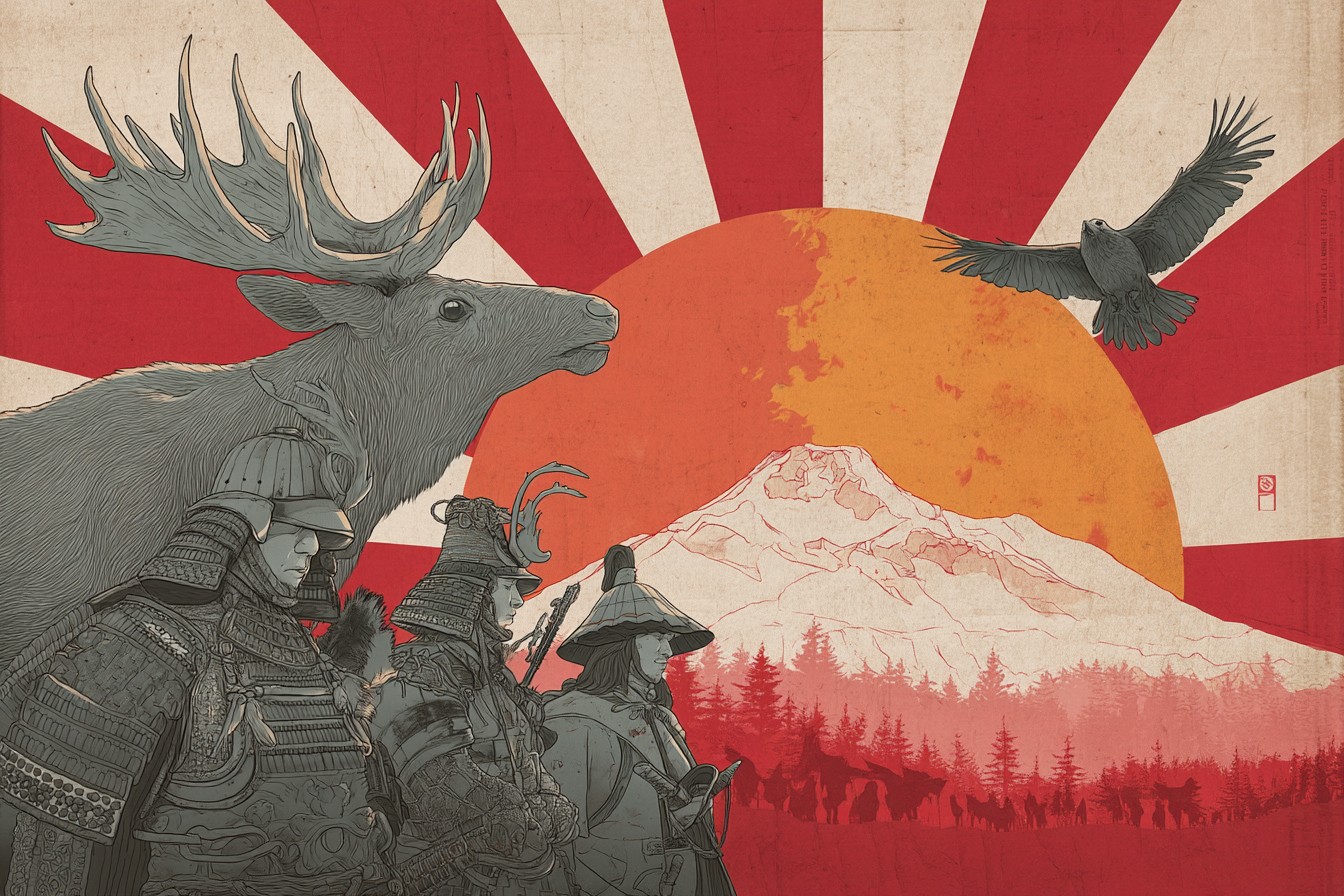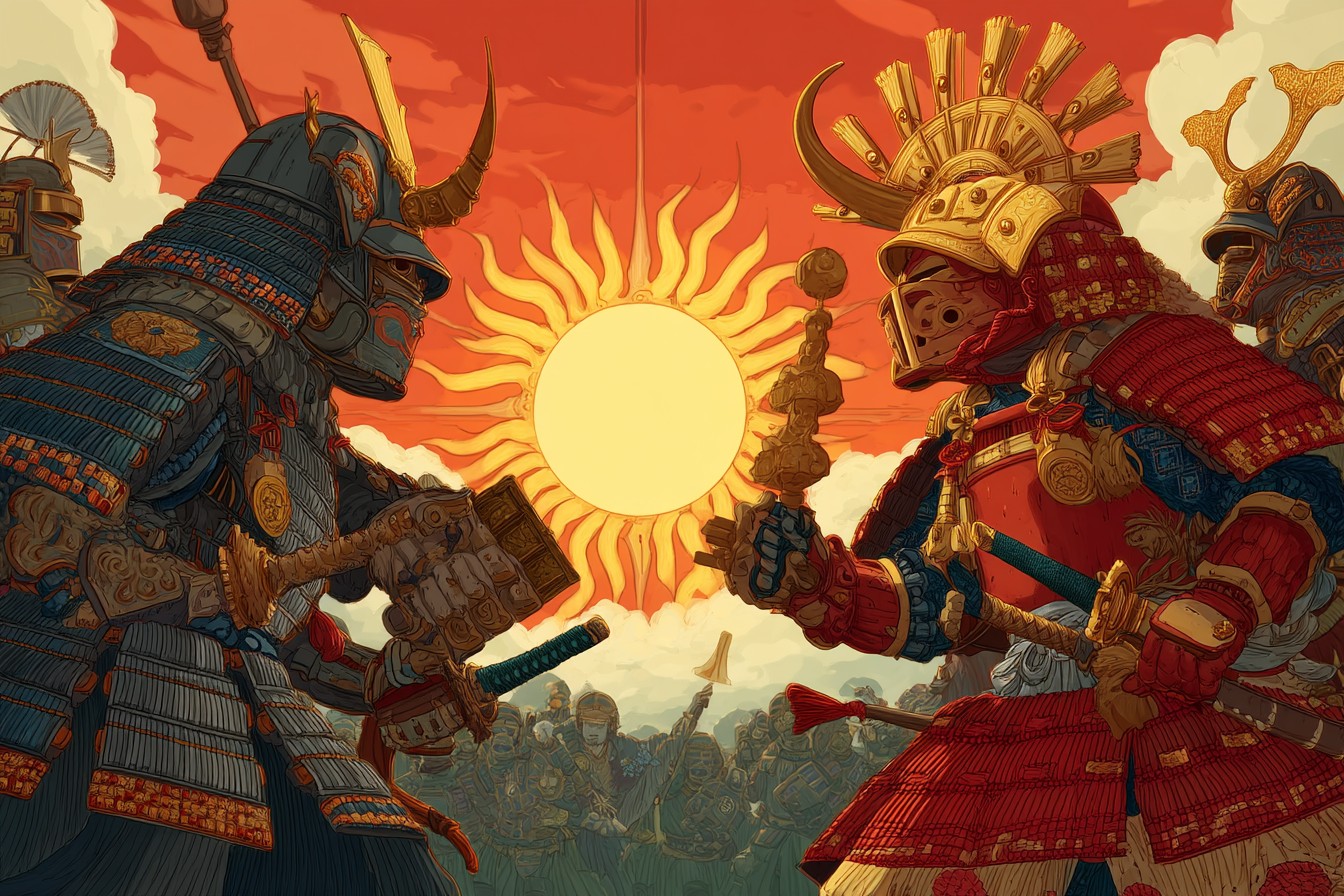The first time I formed an alliance in Rising Sun, I had absolutely no idea what I was doing. Four of us were gathered around my dining room table, the gorgeous miniatures arranged across the map of feudal Japan, and I impulsively offered my hand to Mark, saying, “Allies?” without any real strategic consideration. He accepted with a grin that should have warned me. Two seasons later, he’d leveraged our alliance to secure dominant positions in key provinces while contributing almost nothing to my strategic goals. When the inevitable betrayal came in the final season, he was positioned for a commanding victory while I scrambled for scraps.
“You have to think about what you’re actually getting from an alliance,” he explained afterward, seemingly genuinely concerned about my crestfallen expression. “It’s not just about having a friend.” That painful lesson kickstarted what has become a fascinating strategic journey across 40+ plays of Rising Sun, exploring the nuances of alliances that actually benefit both parties—at least until the moment they don’t.
My gaming group now jokes about my “alliance spreadsheets,” a good-natured exaggeration of how methodically I approach these temporary partnerships. “David’s calculating the exact numeric value of your friendship,” Linda will quip whenever I pause to consider an alliance offer. There’s some truth to the ribbing—I have become somewhat notorious for evaluating alliances with almost mathematical precision. But the results speak for themselves. I’ve yet to be on the receiving end of such a lopsided alliance since that first disastrous experience.
The fundamental principle I’ve discovered for successful alliance negotiation is what I call “complementary asymmetry”—identifying what each clan can offer that uniquely benefits the other without undermining their own position. The best alliances aren’t based on identical exchanges but on contributions that have different values to each player based on their clan abilities, board positions, and strategic objectives.
I learned this principle through repeated alliance failures where we attempted to divide benefits equally. During a memorable game with our regular Friday group, I formed an alliance with Sarah based on a straightforward “you take these provinces, I’ll take those” arrangement. It seemed fair on the surface but completely ignored the fact that her Lotus Clan gained substantially more from controlling my assigned territories due to their harvesting mechanism than I gained from hers. By the time we dissolved the alliance, she had established an insurmountable advantage. The lesson was clear—equal divisions rarely create equal benefits in a game with such asymmetric clan powers.
Clan selection creates the foundation for alliance potential, establishing what unique advantages you can offer potential partners. Some clans, like the Koi with their extra political mandates, make naturally attractive allies because they provide benefits that extend to their partners. Others, like the Dragonfly with their movement advantages, offer less direct alliance value but can still be desirable partners in specific board situations.
My friend Pete, who approaches games with remarkable strategic clarity, developed an interesting framework for alliance compatibility based on clan abilities. “There are force multiplier clans and resource generator clans,” he explained during a post-game analysis. “The strongest alliances pair one of each.” His observation has proven consistently accurate—partnerships between clans like the Koi (who multiply mandate effectiveness) and the Bonsai (who generate coin advantages) tend to create more mutually beneficial dynamics than alliances between clans with similar functional roles.
The seasonal structure of Rising Sun creates distinct alliance considerations for each phase of the game. Spring alliances, formed before any territories are controlled, operate almost entirely on promised future behaviors rather than immediate advantages. Summer alliances build upon established positions and often focus on consolidating territorial control. Fall alliances, if they form at all, tend to be opportunistic and focused on specific win-blocking objectives rather than broad cooperation.
This seasonal evolution became clear during a game where I maintained the same alliance partner (my brother-in-law Mike) throughout all three seasons but completely renegotiated the terms of our cooperation at each seasonal tea ceremony. Our Spring alliance focused on dividing the map into spheres of influence, with minimal specific commitments. By Summer, we’d established clear protocols for which mandate benefits would flow to which player. In Fall, our alliance became much more transactional, essentially operating as a non-aggression pact with specific agreements about harvest distribution. This dynamic evolution allowed our partnership to remain mutually beneficial despite the changing game state.
Geographic proximity creates natural alliance tensions that must be addressed explicitly during negotiations. Adjacent clans will inevitably compete for territory, making alliances between neighbors inherently more complex than those between clans operating in different regions. I’ve found that successful neighbor alliances require much more detailed territorial agreements, often specifying exactly which provinces each clan will prioritize and how contested regions will be resolved.
During a five-player game where I found myself (as the Turtle Clan) positioned directly adjacent to Linda’s Lotus Clan, we formed what the other players dubbed a “border treaty” rather than a full alliance. Our agreement specified exactly which provinces each of us would control, with careful attention to ensuring both received territories that synergized with our clan abilities. This highly structured arrangement allowed us to avoid wasteful conflict despite our geographic overlap, creating mutual advantage without requiring broader strategic alignment.
Mandate selection presents perhaps the most crucial aspect of alliance benefits. The ability to coordinate which political mandates each ally selects, ensuring complementary actions rather than redundancy, creates significant advantages over non-allied players who must react to mandates rather than anticipating them. Establishing clear communicationabout mandate priorities before each political phase maximizes this advantage.
I recall a particularly effective alliance with my colleague Jim, who approaches Rising Sun with almost mathematical precision. Before each mandate selection, we’d quickly confer about our priorities for the round. If we both wanted different mandates, no coordination was necessary. But when we both valued the same mandate (typically Recruit or Marshal), we’d establish who needed it more urgently and compensate the other for selecting a less preferred option. This mandate coordination alone provided efficiency that non-allied players simply couldn’t match, allowing us to effectively execute two coordinated strategies rather than a single consolidated one.
Battle coordination represents another cornerstone of effective alliances, particularly in managing the ronin economy. Allied clans can strategically allocate their ronin recruitment, ensuring that each has sufficient forces for their priority battles while avoiding wasteful overbidding on mercenaries. This coordination extends to battle selection itself, with allies agreeing which conflicts each will prioritize to avoid competing for the same victories.
During a tournament game (yes, I occasionally play Rising Sun competitively, which Linda finds endlessly amusing), my alliance partner and I developed a surprisingly effective battle coordination system. We each identified our two highest-priority provinces for the upcoming battle phase, ensuring no overlap in these primary targets. For secondary targets, we established a rough coin bidding limit to avoid driving up ronin costs for each other. This systematic approach allowed both of us to secure our most valuable provinces while spending significantly fewer coins than our opponents, who often found themselves in unintentional bidding wars.
The betrayal mechanics—when seasonal alliances dissolve—adds a fascinating meta-layer to negotiation strategies. Every alliance in Rising Sun is temporary, with the final season typically featuring no formal partnerships. This inevitability of betrayal shapes alliance negotiations from the very beginning, as effective players must simultaneously plan for cooperative advantage and position themselves for the post-alliance conflict.
My approach to this betrayal dynamic has evolved significantly over dozens of plays. In early games, I tended to form alliances with minimal consideration for the eventual dissolution, focusing entirely on immediate benefits. The resulting betrayals often found me poorly positioned and vulnerable. Now I explicitly factor post-alliance positioning into every negotiation, sometimes declining otherwise favorable partnerships if they would leave me excessively vulnerable when alliances break. As the saying goes, “Keep your friends close, but keep your exit strategy closer.”
My friend Sarah, who has a remarkable talent for social deduction games, applies what she calls the “selective transparency” approach to alliance negotiations. “I tell my allies exactly what I intend to do—except for the one thing I don’t tell them,” she explained after executing a particularly elegant betrayal. This method of being honest about most intentions while maintaining strategic ambiguity about key vulnerabilities has proven remarkably effective, creating alliances built on sufficient trust to function while preserving the leverage needed for the inevitable dissolution.
Resource asymmetry between clans creates natural alliance opportunities that benefit both parties. Clans with coin generation advantages but limited force projection can pair effectively with militarily strong clans that struggle with economy. Similarly, clans with strong harvesting abilities often align well with those who excel at territorial control. Identifying these complementary resource profiles forms the basis for many of the most successful alliances I’ve witnessed.
In a recent game, I observed a particularly effective alliance between the Lotus Clan (with strong harvesting capabilities) and the Bonsai Clan (with economic advantages). Rather than competing for the same provinces, they established a resource-sharing arrangement where Bonsai controlled key economic territories and shared coin advantages, while Lotus managed harvesting provinces and shared collected virtues. This specialization allowed both clans to leverage their unique strengths while compensating for individual weaknesses—the essence of mutually beneficial alliance.
The social dimension of alliance negotiation cannot be overlooked, despite my tendency toward analytical optimization. Effective communication, reliability, and the perception of fairness significantly impact alliance effectiveness beyond the pure mechanical advantages. I’ve found that even slightly less optimal alliances with trusted partners often outperform theoretically superior arrangements with players whose negotiation style creates uncertainty or tension.
My colleague Mark, who tends toward aggressive gameplay, once formed an alliance with me that looked perfect on paper—our clan abilities complemented each other beautifully, and our starting positions created minimal territorial conflict. Yet the alliance functioned poorly because his communication style left me constantly uncertain about his intentions. Contrast that with a later alliance with Pete, which offered fewer obvious synergies but operated smoothly due to his clear, consistent communication about priorities and expectations. The lesson was clear—mechanical optimization means little without social alignment.
Alliance negotiation timing creates interesting strategic considerations. While formal alliances form only during seasonal tea ceremonies, the discussions that shape these partnerships often begin much earlier. I’ve found that initiating alliance conversations before the game begins, based solely on clan selection, often yields more strategically sound partnerships than reactive alliances formed in response to immediate board positions.
During a recent game with players of mixed experience levels, I observed how dramatically timing affected alliance quality. The more experienced players had begun informal alliance discussions during clan selection, identifying potential synergies before territories were even claimed. The newer players, by contrast, approached the first tea ceremony with no predetermined preferences, making decisions based solely on the opening board state. The resulting difference in alliance effectiveness was striking—the pre-planned partnerships operated with clear strategic alignment from the first turn, while the reactive alliances struggled to establish consistent cooperative patterns.
The shifting value of different mandates throughout the game creates another dimension of alliance negotiation. Spring politics typically emphasize Recruit and Marshal actions to establish initial positions. Summer often values Harvest and Train as resource engines develop. Fall frequently prioritizes Marshal and Betray as final positions are contested. Effective alliance negotiations account for these shifting priorities, establishing flexibility in mandate coordination rather than fixed patterns.
I discovered the importance of this seasonal adaptation during a game where our alliance agreement specified a rigid mandate selection pattern regardless of game state. By Summer, this inflexibility had become actively detrimental as the board situation demanded different priorities than we’d initially established. In subsequent games, I’ve approached mandate coordination with phase-specific considerations, renegotiating priorities at each seasonal transition to ensure our alliance remains responsive to the evolving game state.
Public perception of alliances influences their effectiveness beyond the mechanical advantages they provide. When other players perceive an alliance as particularly strong, they often respond with increased aggression or counter-alliances, potentially negating the original partnership’s advantages. Conversely, alliances that appear less threatening may operate with reduced interference, sometimes generating greater actual benefit despite less obvious synergies.
This perception management became apparent during a five-player game where my alliance with Linda appeared so dominant on paper that the other three players essentially formed a counter-coalition, coordinating their actions specifically to undermine our position. In a later game, I formed a much less ostentatious alliance with a less experienced player, drawing minimal attention despite actually securing more cumulative advantage than the previous partnership. This experience taught me the value of alliance subtlety—sometimes the most effective partnerships are those that generate significant advantage without appearing to do so.
The mathematical evaluation of alliance benefits provides a useful framework for negotiation, but the psychological aspects of these partnerships often prove equally important. Players who feel they’re receiving fair value from an alliance generally cooperate more effectively than those who suspect they’re being exploited, even if the objective benefit distribution is identical. I’ve found that explicitly acknowledging each player’s contributions to the alliance, particularly when they make sacrifices for mutual benefit, significantly enhances cooperation quality.
During a particularly complex game with our regular group, my alliance with Pete encountered a situation where mandate selection forced one of us to accept a significantly suboptimal action. After discussing the options, Pete voluntarily took the less valuable mandate, allowing me to execute a critical recruitment. Rather than simply accepting this sacrifice, I explicitly acknowledged it and committed to reciprocating at the next opportunity. This transparency about value exchange maintained our cooperative effectiveness even through temporarily imbalanced interactions.
After all these games and all this analysis, perhaps the most important insight I’ve gained about alliance negotiation in Rising Sun is that the best partnerships aren’t those that maximize absolute advantage but those that create resilient cooperation through perceived fairness and mutual respect. The mechanical optimization of complementary clan abilities and efficient mandate selection provides the foundation, but the human elements of communication, reliability, and reciprocity determine whether an alliance thrives or collapses under the weight of suspicion and uncertainty.
I still occasionally misjudge alliance dynamics or fail to anticipate how game developments will affect our partnership’s value proposition. But those missteps have become rarer as I’ve developed a more nuanced understanding of what makes alliances truly beneficial for both parties. There’s something deeply satisfying about executing a perfectly coordinated strategy with a trusted ally, even knowing that our partnership will inevitably dissolve into competition as the seasons change.
And really, isn’t that tension between cooperation and competition what makes Rising Sun so fascinating? The knowledge that today’s ally will become tomorrow’s opponent creates a negotiation landscape unlike any other game in my collection. Now if you’ll excuse me, I need to go review my notes on Koi Clan alliance strategies before our game night tomorrow. Linda has already challenged me to ally with her, and I suspect she’s been developing some new negotiation tactics I haven’t seen before.







Leave a Reply